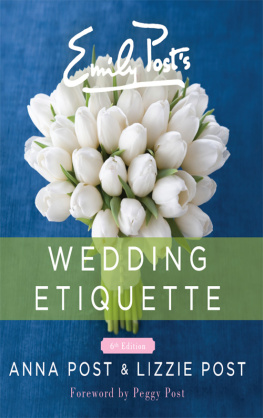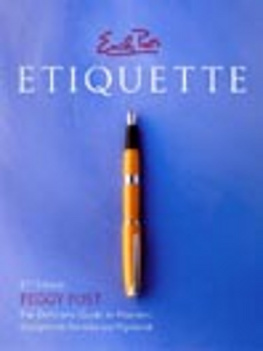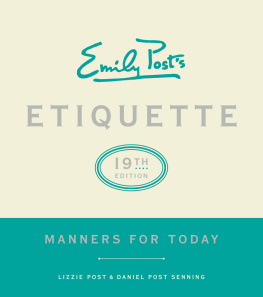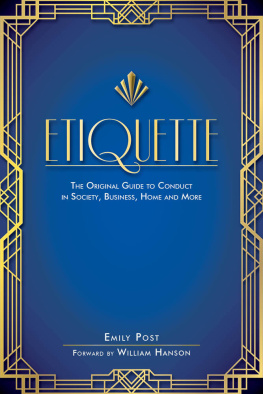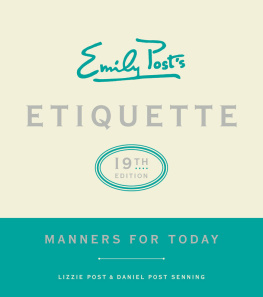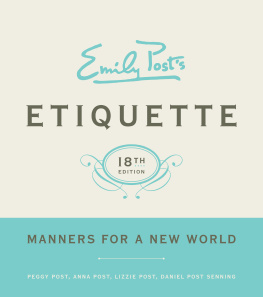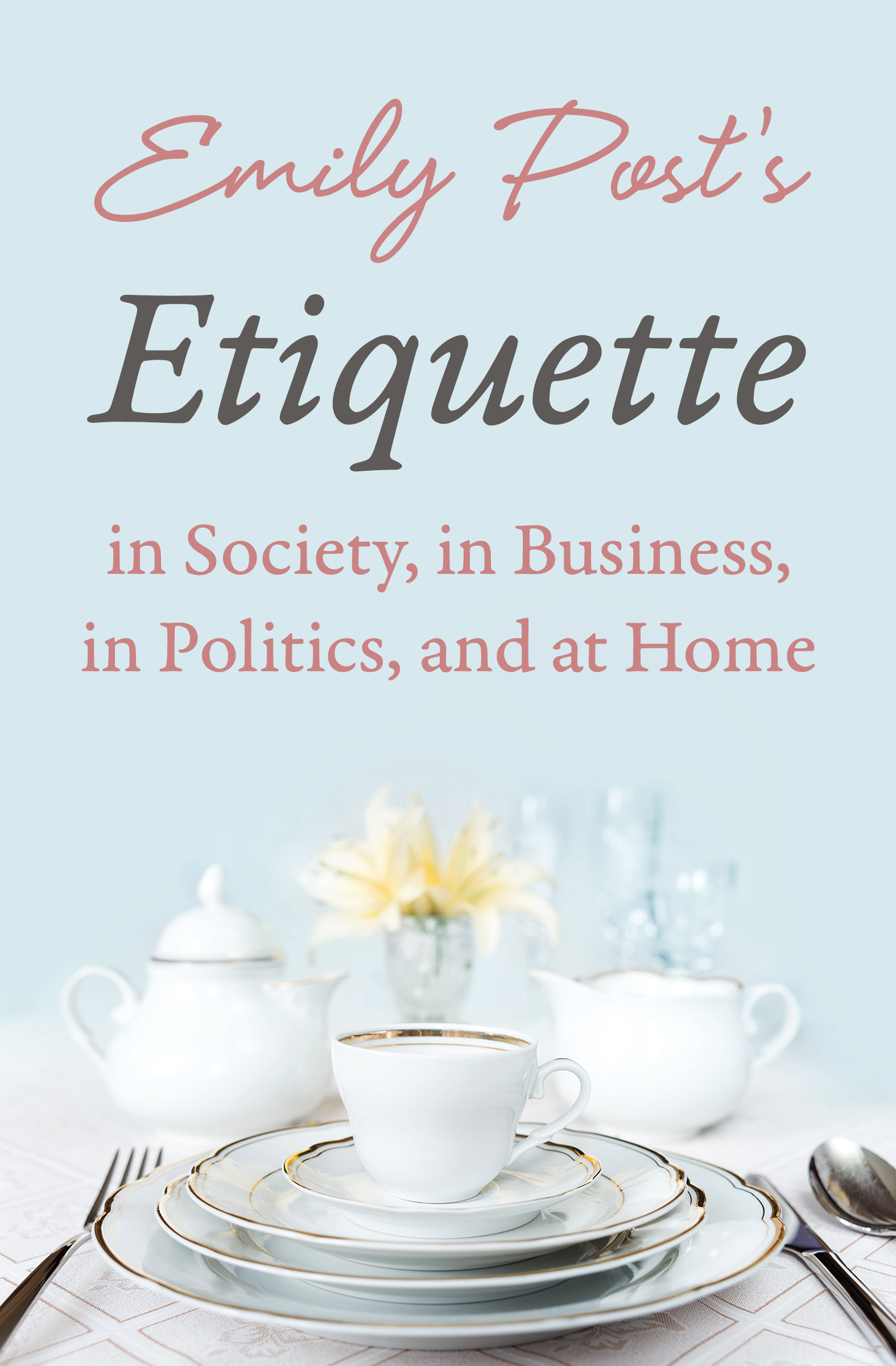Etiquette in Society, in Business, in Politics, and at Home
Emily Post

To you my friends whose identity in these pages is veiled in fictional disguise it is but fitting that I dedicate this book.
CHAPTER I
WHAT IS BEST SOCIETY?
Society is an ambiguous term; it may mean much or nothing. Every human beingunless dwelling alone in a caveis a member of society of one sort or another, and therefore it is well to define what is to be understood by the term Best Society and why its authority is recognized. Best Society abroad is always the oldest aristocracy; composed not so much of persons of title, which may be new, as of those families and communities which have for the longest period of time known highest cultivation. Our own Best Society is represented by social groups which have had, since this is America, widest rather than longest association with old world cultivation. Cultivation is always the basic attribute of Best Society, much as we hear in this country of an Aristocracy of wealth.
To the general public a long purse is synonymous with high positiona theory dear to the heart of the yellow press and eagerly fostered in the preposterous social functions of screen drama. It is true that Best Society is comparatively rich; it is true that the hostess of great wealth, who constantly and lavishly entertains, will shine, at least to the readers of the press, more brilliantly than her less affluent sister. Yet the latter, through her quality of birth, her poise, her inimitable distinction, is often the jewel of deeper water in the social crown of her time.
The most advertised commodity is not always intrinsically the best, but is sometimes merely the product of a company with plenty of money to spend on advertising. In the same way, money brings certain people before the publicsometimes they are persons of quality, quite as often the so-called society leaders featured in the public press do not belong to good society at all, in spite of their many published photographs and the energies of their press-agents. Or possibly they do belong to smart society; but if too much advertised, instead of being the queens they seem, they might more accurately be classified as the court jesters of to-day.
The Imitation And The Genuine
New York, more than any city in the world, unless it be Paris, loves to be amused, thrilled and surprised all at the same time; and will accept with outstretched hand any one who can perform this astounding feat. Do not underestimate the ability that can achieve it: a scintillating wit, an arresting originality, a talent for entertaining that amounts to genius, and gold poured literally like rain, are the least requirements.
Puritan America on the other hand demanding, as a ticket of admission to her Best Society, the qualifications of birth, manners and cultivation, clasps her hands tight across her slim trim waist and announces severely that New Yorks Best is, in her opinion, very bad indeed. But this is because Puritan America, as well as the general public, mistakes the jester for the queen.
As a matter of fact, Best Society is not at all like a court with an especial queen or king, nor is it confined to any one place or group, but might better be described as an unlimited brotherhood which spreads over the entire surface of the globe, the members of which are invariably people of cultivation and worldly knowledge, who have not only perfect manners but a perfect manner. Manners are made up of trivialities of deportment which can be easily learned if one does not happen to know them; manner is personalitythe outward manifestation of ones innate character and attitude toward life. A gentleman, for instance, will never be ostentatious or overbearing any more than he will ever be servile, because these attributes never animate the impulses of a well-bred person. A man whose manners suggest the grotesque is invariably a person of imitation rather than of real position.
Etiquette must, if it is to be of more than trifling use, include ethics as well as manners. Certainly what one is, is of far greater importance than what one appears to be. A knowledge of etiquette is of course essential to ones decent behavior, just as clothing is essential to ones decent appearance; and precisely as one wears the latter without being self-conscious of having on shoes and perhaps gloves, one who has good manners is equally unself-conscious in the observance of etiquette, the precepts of which must be so thoroughly absorbed as to make their observance a matter of instinct rather than of conscious obedience.
Thus Best Society is not a fellowship of the wealthy, nor does it seek to exclude those who are not of exalted birth; but it is an association of gentle-folk, of which good form in speech, charm of manner, knowledge of the social amenities, and instinctive consideration for the feelings of others, are the credentials by which society the world over recognizes its chosen members.
CHAPTER II
INTRODUCTIONS
The Correct Form
The word present is preferable on formal occasions to the word introduce. On informal occasions neither word is expressed, though understood, as will be shown below. The correct formal introduction is:
Mrs. Jones, may I present Mr. Smith?
or,
Mr. Distinguished, may I present Mr. Young?
The younger person is always presented to the older or more distinguished, but a gentleman is always presented to a lady, even though he is an old gentleman of great distinction and the lady a mere slip of a girl.
No lady is ever, except to the President of the United States, a cardinal, or a reigning sovereign, presented to a man. The correct introduction of either a man or woman:
To the President,
is,
Mr. President, I have the honor to present Mrs. Jones, of Chicago.
To a Cardinal,
is,
Your Eminence, may I present Mrs. Jones?
To a King:
Much formality of presenting names on lists is gone through beforehand; at the actual presentation an accepted name is repeated from functionary to equerry and nothing is said to the King or Queen except: Mrs. Jones.
But a Foreign Ambassador is presented, Mr. Ambassador, may I present you to Mrs. Jones.
Very few people in polite society are introduced by their formal titles. A hostess says, Mrs. Jones, may I present the Duke of Overthere? or Lord Blank?; never his Grace or his Lordship. The Honorable is merely Mr. Lordson, or Mr. Holdoffice. A doctor, a judge, a bishop, are addressed and introduced by their titles. The clergy are usually Mister unless they formally hold the title of Doctor, or Dean, or Canon. A Catholic priest is Father Kelly. A senator is always introduced as Senator, whether he is still in office or not. But the President of the United States, once he is out of office, is merely Mr. and not Ex-president.
The Prevailing Introduction And Inflection
In the briefer form of introduction commonly used,
Mrs. Worldly, Mrs. Norman,
if the two names are said in the same tone of voice it is not apparent who is introduced to whom; but by accentuating the more important persons name, it can be made as clear as though the words May I present had been used.
The more important name is said with a slightly rising inflection, the secondary as a mere statement of fact. For instance, suppose you say, Are you there? and then It is raining! Use the same inflection exactly and say, Mrs. Worldly?Mrs. Younger!
Are you there?It is raining!
Mrs. Worldly?Mrs. Younger!



